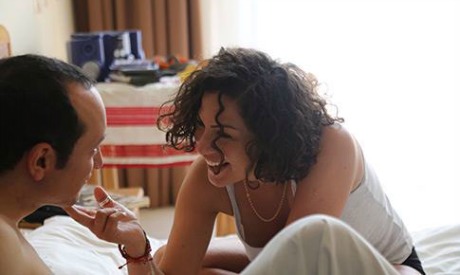
Hedi: a Wind of Freedom (photo: film still)
Characters’ names can sometimes be a reflection of their actions and temperaments. That is certainly the case for Hedi (Majd Mastoura), in Tunisian director Mohamed Ben Attia’s film Hedi: A Wind of Freedom. The film was released last year in France and is currently showing in Cairo’s cinema Zawya.
Hedi means calm or wise in Arabic. That is indeed how Hedi’s mother (Sabah Bouzouita) likes to see her son, whose life she controls, leaving him little room to make his own choices.
While his mother actively prepares his marriage, Hedi, who works in the field of business, is sent to Mahdia by his employer to search for new clients. There he meets Rim (Rym Ben Messaoud), who works as an animator in a local hotel, and is seduced by her freedom and independence. For the first time, the calm and
reserved young man tries to take his life into his own hands. Love brings him to counter his mother’s decisions, defying her crushing authority at last.
The entire country is in a state of transition following the Arab spring. The film’s events mirror the state of many young Arabs, torn apart by the gap between their hopes and desires, and their lives; between the things of which they dream, and those within reach.
The choice of presenting a man crushed under the weight of family and society rather than a woman is a significant choice. This shows that in the Arab world, everyone falls victim to the same oppression. No one is spared, contrary to popular discourse.
The film tackles the issue of personal freedoms in the general sense, insisting that one must free oneself from within before fighting social conventions and constraints. Hence the ending of the film, when Hedi rejects Rim’s influence, despite his love for her. He questions everyone, including himself, yet simultaneously refrains from harshly judging other characters.
The filmmaker does not fall into the trap of wanting to judge characters, or categorise them as either good or evil. He rather attempts to justify their behaviours, as he did when explaining the reasons behind Hedi’s mother and his employer’s authoritarian natures.
Hedi’s employer was oppressed in every aspect of his life, at home, at work and everywhere else. Later, Rim, the rebellious girl who seduced the protagonist, also tried to take over his life and choices. Hence one of the most violent and sensual confrontation scenes in the film.
Hedi: A Wind of Freedom, is quite aesthetically pleasing. Everything flows calmly. The characters, who are well-portrayed, are not very complex, but they are deep. Without becoming too politicised, the film succeeds in getting to the bottom of the crisis.
By depicting a personal problem, the film evokes a societal one affecting the post-revolutionary reality. Hedi’s business trip, for instance, which he undertook to broaden his clientele, is reflective of the economic climate of the revolution.
There is a clear relation between politics and daily life, where existential crisis tears the characters apart.
Tunisian cinema has garnered much attention recently via films like this and Raja Amari’s Foreign Bodies. Both films received critical acclaim at regional and international festivals, and were praised by film enthusiasts. Ben Attia was awarded the Best First Feature at the Berlinale and actor Majd Mastoura’s performance was awarded as well, after Tunisia had been absent from the festival for nearly 20 years.
Do not miss the film screening at cinema Zawya.
For more arts and culture news and updates, follow Ahram Online Arts and Culture on Twitter at @AhramOnlineArts and on Facebook at Ahram Online: Arts & Culture
Short link: